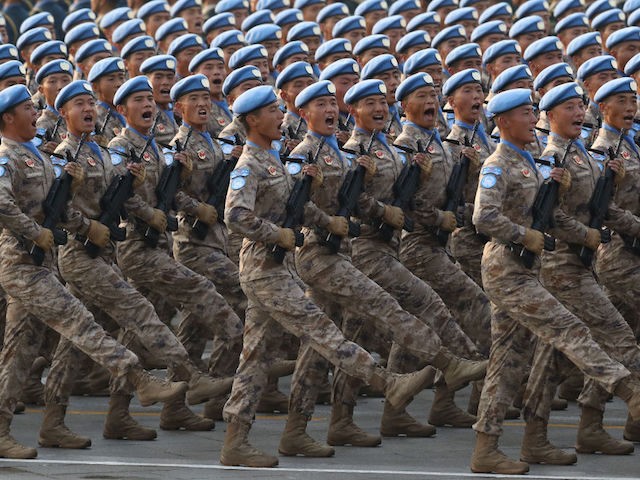Chinese state media on Monday threatened to attack the “frenzied” United States over “anti-China decisions” made in the final days of the Trump administration, particularly the administration’s expressions of support for Taiwan.
An editorial at the state-run Global Times fulminated against Secretary of State Mike Pompeo for sending Kelly Craft, the U.S. ambassador to the United Nations, on a trip to Taiwan and lifting restrictions on other contacts between American and Taiwanese officials.
The Global Times portrayed Pompeo as a rampaging madman looking to start a world war:
Only 10 days are left for the incumbent US government, but it may become the most challenging period for China-US relations. Pompeo has shown his madness in policies toward China. He has the potential to play out all anti-China “cards,” and had [sic] done some completely incredible acts in the recent past. Pompeo’s team is working like a retreating army to knock down every building, then bury land mines, in a bid to prevent potential reconstruction.
China must resolutely crack down on these saboteurs and take drastic measures against them before their destruction gravely impairs China’s core interests. China must not tolerate their abuses.
As Pompeo’s team will soon be out of power, China needs to avoid entanglement and maintain its bottom line of China-US relations amid the US power transition. This will be consistent with China’s interests. But the precondition is that outgoing US officials should adhere to rules and regulations and restrain from pushing more destructive approaches. The US political system should constrain their moves.
“Pompeo and his likes are frenzied and out of control. With the U.S. establishment standing by to watch the fight, Pompeo and his supporters are in a state of willful arrogance that allows them to do whatever they want vis-à-vis the China-U.S. relationship,” the Chinese editorialists seethed.
After railing at length about how the arrogant Americans have “forgotten that the Taiwan Straits are where China’s game tools are growing the fastest,” and asserting China’s “rapidly growing power” in the region can deal a “heavy blow to U.S. arrogance,” the Global Times threatened to “strike back firmly and hard” if Washington or the “Taiwan secessionists” go too far.
“We would rather face a Taiwan Straits crisis, even a storm, in the next 10 days if Pompeo and his likes become more aggressive and provocative before leaving office. The crisis will teach Taiwan secessionists a lesson and nail Pompeo and his likes to the pillar of shame. Even if this will cause a shock to China-U.S. relations during the period of power change in the U.S., it will bring more benefits to the normal development of bilateral relations in the long term,” the editorial concluded.
An editorial from Global Times editor Hu Xijin on Monday leaned heavily on China’s talking point that the Capitol riot has forever disqualified America from complaining about Chinese human rights abuses, and conclusively demonstrated the superiority of Chinese authoritarianism.
“The U.S. has really blown it, not just the Trump administration, but the whole of the U.S.,” Hu wrote.
Hu insisted it was time for the United States to admit China’s understanding of concepts like “free speech” is superior to its own:
Take freedom of speech. It is written in Article 35 of the Chinese constitution and is one of the basic rights of the Chinese people. But freedom of speech has boundaries. This is also our long-term understanding. The US spared no effort to deny China’s interpretation of our boundaries of freedom of speech. Now it has let the cat out of the bag, acknowledging its own boundaries of the concept through facts. This is not China’s win, but a victory for adhering to the principle of seeking truth from facts.
I hope and believe recent behavior of the US will not affect China. They suspended Trump’s account on social media platforms, and banned Parler. Those moves will not have any exemplary effect on Chinese society. We won’t take US actions as excuses to expand our internet regulation. China will continue to maintain our relevant regulations and guiding principles, maintaining its internet public opinion order which is based on the law. But it will also safeguard freedom of expression and explore the best relationship between the law and freedom under China’s national conditions, enhancing the diverse ecology of the Chinese public opinion field.
“The U.S. is gradually doing exactly the same thing it once condemned what other countries did,” Hu said of the rising tide of China-style censorship in America. “It will be hard to dress itself as a global beacon of democracy again.”

COMMENTS
Please let us know if you're having issues with commenting.